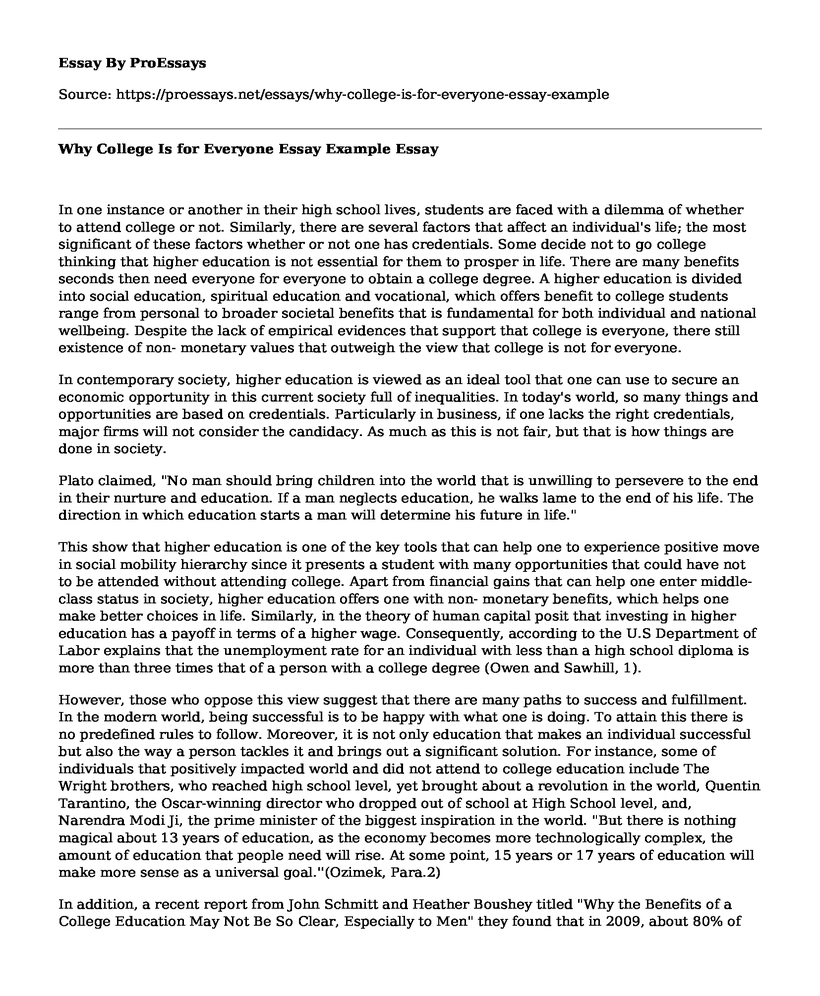In one instance or another in their high school lives, students are faced with a dilemma of whether to attend college or not. Similarly, there are several factors that affect an individual's life; the most significant of these factors whether or not one has credentials. Some decide not to go college thinking that higher education is not essential for them to prosper in life. There are many benefits seconds then need everyone for everyone to obtain a college degree. A higher education is divided into social education, spiritual education and vocational, which offers benefit to college students range from personal to broader societal benefits that is fundamental for both individual and national wellbeing. Despite the lack of empirical evidences that support that college is everyone, there still existence of non- monetary values that outweigh the view that college is not for everyone.
In contemporary society, higher education is viewed as an ideal tool that one can use to secure an economic opportunity in this current society full of inequalities. In today's world, so many things and opportunities are based on credentials. Particularly in business, if one lacks the right credentials, major firms will not consider the candidacy. As much as this is not fair, but that is how things are done in society.
Plato claimed, "No man should bring children into the world that is unwilling to persevere to the end in their nurture and education. If a man neglects education, he walks lame to the end of his life. The direction in which education starts a man will determine his future in life."
This show that higher education is one of the key tools that can help one to experience positive move in social mobility hierarchy since it presents a student with many opportunities that could have not to be attended without attending college. Apart from financial gains that can help one enter middle-class status in society, higher education offers one with non- monetary benefits, which helps one make better choices in life. Similarly, in the theory of human capital posit that investing in higher education has a payoff in terms of a higher wage. Consequently, according to the U.S Department of Labor explains that the unemployment rate for an individual with less than a high school diploma is more than three times that of a person with a college degree (Owen and Sawhill, 1).
However, those who oppose this view suggest that there are many paths to success and fulfillment. In the modern world, being successful is to be happy with what one is doing. To attain this there is no predefined rules to follow. Moreover, it is not only education that makes an individual successful but also the way a person tackles it and brings out a significant solution. For instance, some of individuals that positively impacted world and did not attend to college education include The Wright brothers, who reached high school level, yet brought about a revolution in the world, Quentin Tarantino, the Oscar-winning director who dropped out of school at High School level, and, Narendra Modi Ji, the prime minister of the biggest inspiration in the world. "But there is nothing magical about 13 years of education, as the economy becomes more technologically complex, the amount of education that people need will rise. At some point, 15 years or 17 years of education will make more sense as a universal goal.''(Ozimek, Para.2)
In addition, a recent report from John Schmitt and Heather Boushey titled "Why the Benefits of a College Education May Not Be So Clear, Especially to Men" they found that in 2009, about 80% of college graduate aged between 24- 35 earned less than the average male high school graduate.
Conclusion
In conclusion, as much as attending college education does not guarantee an upper hand in happiness and success in life, however, it tends to present one with non- monetary values whose benefit run from personal benefits to community benefits that is key to good and decent life generally, hence a child without education is like a bird without wings. (My quote)
Works Cited
Ozimek, Adma. Should Everyone Go To College? 29 May 2014. 11 Dec 2014 <https://www.forbes.com/sites/modeledbehavior/2014/05/29/should-everyone-go-to-college/#39221b652723>.
Prathapan, Supriya. EDUCATION AND SOCIAL MOBILITY. 30 June 2014. 11 Dec 2018 <https://supriyaprathapannotesoneducationalsociology.wordpress.com/2014/06/30/education-and-social-mobility/>.
Sawhill, Stephanie Owen and Isabel. "Should Everyone Go To College? ." Center on Children and Familes (2013): 1-10.
Cite this page
Why College Is for Everyone Essay Example. (2022, Nov 06). Retrieved from https://proessays.net/essays/why-college-is-for-everyone-essay-example
If you are the original author of this essay and no longer wish to have it published on the ProEssays website, please click below to request its removal:
- The Impact of Family Involvement on the Education of Children
- Essay Sample on Developmental Milestones: Birth to Kindergarten
- Identification of Pupil Mental Health Issues Paper Example
- Essay Sample on Child Maltreatment and Psychopathic Traits in Youth
- Mitigating Drug Abuse in Schools: How To Create Awareness & Change Student Behavior - Essay Sample
- Attract College Students to Campus Sponsorship with Dream Brands - Essay Sample
- Paper Example: Developing Sound Lesson Plan Evaluation Framework







